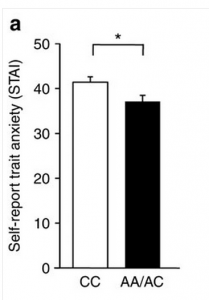Feel-good gene?
From Stuff
Suffering anxiety, is not a mark of character, but at least in part to do with the genetic lottery, he says.
“About 20 per cent of adult Americans have this mutation,” Professor Friedman says of those who produce more anandamide, whose name is taken from the Sanskrit word for bliss.
There’s good biological research behind this story, on how the gene works in both mice and people, but the impact is being oversold. The human data on anxiety in the paper look like
Combining this small difference with the claim that 20% of people in the US carry the variant, it would explain about 1% of the population variation in the anxiety questionnaire score. Probably less of the variation in having/not having clinically diagnosable anxiety.
The story continues
“Those who do [have this mutation] may also be less likely to become addicted to marijuana and, possibly, other drugs – presumably because they don’t need the calming effects that marijuana provides.”
The New York Times version mentioned a study of marijuana dependence, which found people with the low-anxiety mutation were less likely to be dependent. However, for other drugs the opposite has been found:
Here, we report a naturally occurring single nucleotide polymorphism in the human FAAH gene, 385A, that is strongly associated with street drug use and problem drug/alcohol use.
People with the mutant, A, version of the gene, the low-anxiety variant, were more likely to have drug problems. In fact, even the study that found (weak) evidence for lower rates of marijuana dependence found much stronger evidence of higher rates of sedative dependence.
Simple, binary, genetic explanations for complex human conditions are always tempting, but usually wrong.
Thomas Lumley (@tslumley) is Professor of Biostatistics at the University of Auckland. His research interests include semiparametric models, survey sampling, statistical computing, foundations of statistics, and whatever methodological problems his medical collaborators come up with. He also blogs at Biased and Inefficient See all posts by Thomas Lumley »

Genes schmenes.
Genetic code can change within a lifetime? depending on behaviours?
Like cord or rope, things can splice into DNA, and most family jewels are deteriorating due to modern life’s toxins and leasure.
Those who inherited strong health from poor hardworking peasant ancestors have the greatest inheritance of all!
10 years ago
leisure
10 years ago
Genetic changes of the sort this study looked at (single base changes) are very rare within a lifetime.
Now we have DNA sequencing there is empirical confirmation that the mutation rate between parents and children is close to what was expected theoretically: about 100 changes in the 3 billion bases of the genome, of which only one or two will be in a gene.
10 years ago
Your ancestors’ lousy childhoods or excellent adventures might change your personality, bequeathing anxiety or resilience by altering the epigenetic expressions of genes in the brain.
Darwin and Freud walk into a bar. Two alcoholic mice — a mother and her son — sit on two bar stools, lapping gin from two thimbles.
The mother mouse looks up and says, “Hey, geniuses, tell me how my son got into this sorry state.”
“Bad inheritance,” says Darwin.
“Bad mothering,” says Freud.
http://www.jbbardot.com/grandmas-experiences-genes/
10 years ago
Certainly epigenetics exists and may even be veryimportant, but it doesn’t cause this sort of genetic change. What they were looking at wasn’t an epigenetic gene expression change, it was a single-nucleotide polymorpism, a DNA sequence change.
10 years ago